#bhagavadgita
Explore tagged Tumblr posts
Text
Do you know 108 names of lord Krishna?
Yes, I know and also I can provide you with the 108 names of Lord Krishna along with their meanings. These names are known as the "Ashtottara Shatanamavali" and are recited as a form of devotion and prayer. Here are the 108 names of Lord Krishna:
Om Shri Krishnaya Namaha - Dark Complexioned Lord
Om Kamala Nathaya Namaha Consort Of Goddess Lakshmi
Om Vaasudevaya Namaha Son Of Vasudev
Om Sanatanaya Namaha The Eternal One
Om Vasu devatma jaaya Namaha Son Of Vasudev
Om Punyaya Namaha Supremely Pure
Om Lila-Manusha-Vigrahaya Namaha Assuming Human Form To Perform Pastimes
Om Shrivatsa Kausthubha-Dharaya Namaha Wearing Shri Vatsa And Kausthubha Gem
Om Yashoda-Vatsalaya Namaha Mother Yashoda’s Loving Child
Om Haraye Namaha The Lord Of Nature
Om Chaturbhujatta-Chakrasi-Gada-Shankadhyayudhaya Namaha Four Armed One Carrying Weapons Of Disc,Club,Conch
12. Om Devaki Nandanaya NamahaSon Of Mother Devaki
13 Om Shrisaya Namaha Abode Of Shri (Lakshmi)
14 Om Nandagopa Priyatmajaya NamahaNanda Gopa’s Loving Child
15 Om Yamunavega Samharine NamahaDestroyer Of Speed Of River Yamuna
16 Om Balabhadra Priyanujaya Namaha Balram’s Younger Brother
17 Om Putana Jivita Haraya Namaha The One Who Took The Life Of Demoness Putana
18 Om Shakatasura Bhanjanaya NamahaDestroyer Of Demon Shakatasur
19 Om Nandavraja Jana Nandine Namaha The One Who Is Bringing Joy To Nand And People Of Braj
20 Om Sachidananda Vigrahaya Namaha Embodiment Of Existence, Awareness And Bliss
21 Om Navanita Viliptangaya NamahaLord Whose Body Is Smeared With Butter
22 Om Navanita Nataya Namaha The One Who Dances For Butter
23 Om Anaghaya Namaha The Unmanifested
24 Om Navanita Navaharaya Namaha The One Who Dances For Butter
25 Om Muchukunda Prasadakaya Namaha The Lord Who Graced Muchukunda
26 Om Shodasha Sthri Sahasreshaya Namaha The Lord Of 16,000 Women
27 Om Tribhangi Lalitakritaye Namaha The One Who Has Threefold Bending Form
28 Om Sukavag Amritabhdhindave NamahaOcean Of Nectar According To Sukadeva (Shuka)
29 Om Govindaya Namaha One Who Pleases The Cows, The Land And The Entire Nature
30 Om Yoginam Pataye Namaha Lord Of The Yogis
31 Om Vatsa Vatacharaya Namaha The One Who Goes About Caring For Calves
32 Om Anantaya Namaha The Endless Lord
33 Om Dhenukasura Mardanaya Namaha The Lord Who Beat Up The Demon Dhenukasura
34 Om Trinikrita Trinavartaya Namaha Lord Who Killed Trnavarta, The Whirlwind Demon
35 Om Yamalarjuna Bhanjanaya Namaha The Lord Who Broke The Two Arjuna Trees
36 Om Uttala Talabhettre NamahaThe Lord Who Broke All The Big, Tala Trees (Killing Dhenuka)
37 Om Tamala Shyamala Kritaye NamahaLord Who Is Blackish Like A Tamala Tree
38 Om Gopa Gopishvaraya NamahaLord Of The Gopas And Gopis
39 Om Yogine NamahaThe Supreme Master
40Om Koti Surya Samaprabhaya NamahaOne Who Is As Lustrous As A Million Suns
41Om Ilapataye NamahaThe One Who Is The Master Of Knowledge
42Om Parasmai Jyotishe NamahaOne With A Supreme Light
43Om Yadavendraya NamahaLord Of Yadav Clan
44Om Yadudvahaya NamahaLeader Of Yadus
45Om Vanamaline NamahaOne Wearing A Sylven Garland
46Om Pita Vasase NamahaOne Wearing Yellow Robes
47Om Parijatapa Harakaya NamahaOne Who Removes Parijath Flower
48Om Govardhanachalo Dhartre NamahaLifter Of Govardhan Hill
49Om Gopalaya NamahaProtector Of Cows
50Om Sarva Palakaya NamahaProtector Of All Beings
51Om Ajaya NamahaThe Conqueror Of Life And Death
52Om Niranjanaya NamahaThe Unblemished Lord
53Om Kama Janakaya NamahaOne Generating Desires In Worldly Mind
54Om Kancha Lochanaya NamahaOne With Beautiful Eyes
55Om Madhughne NamahaSlayer Of Demon Madhu
56Om Mathura Nathaya NamahaLord of Mathura
57Om Dvaraka Nayakaya NamahaThe Hero Of Dvaraka
58Om Baline NamahaThe Lord Of Strength
59Om Brindavananta Sancarine NamahaOne Who Loiters About The Outskirts Of Vrindavana
60Om Tulasidama Bhushanaya NamahaOne Who Wears A Tulasi Garland
61Om Syamantaka Maner Hartre NamahaWho Appropriated The Sysmantaka Jewel
62Om Nara Narayanatmakaya NamahaThe Selfsame Nara-Narayana
63Om Kubja Krishtambaradharaya NamahaOne Who Applied Ointment By Kubja The Hunchbacked
64Om Mayine NamahaMagician, Lord of Maya
65Om Paramapurushaya NamahaThe supreme one
66Om Mushtikasura Chanura Mallayudha-Visharadaya NamahaOne Who Expertly Fought The Wrestlers Mushtika And Chanura
67Om Samsara Vairine NamahaEnemy Of Material Existence
68Om Kamsaraye NamahaEnemy Of King Kamsa
69Om Muraraye NamahaEnemy Of Demon Mura
70Om Narakantakaya NamahaDestroyer Of Demon Naraka
71Om Anadi Brahmacharine NamahaBeginning Less Absolute
72Om Krishna Vyasana Karshakaya NamahaRemover Of Draupadi’s Distress
73Om Shishupala Shirascettre NamahaRemover Of Shishupal’s Head
74Om Duryodhana Kulantakaya NamahaDestroyer Of Duryodhana’s Dynasty
75Om Vidurakrura Varadaya NamahaDestroyer Of Demon Naraka
76Om Vishvarupa Pradarshakaya NamahaRevealer Of Vishwasrupa (Universal Form)
77Om Satyavache NamahaSpeaker Of Truth
78Om Satya Sankalpaya NamahaLord Of True Resolve
79Om Satyabhama Rataya NamahaLover Of Satyabhama
80Om Jayine NamahaThe Ever Victorious Lord
81Om Subhadra Purvajaya NamahaBrother Of Subhadra
82Om Vishnava NamahaLord Vishnu
83Om Bhishma Mukti Pradayakaya NamahaOne Who Bestowed Salvation To Bhishma
84Om Jagadgurave NamahaPreceptor Of The Universe
85Om Jagannathaya NamahaLord Of The Universe
86Om Venunada Visharadaya NamahaOne Expert In Playing Of Flute Music
87Om Vrishabhasura Vidhvamsine NamahaDestroyer Of Demon Vrishbasura
88Om Banasura Karantakaya NamahaThe Lord Who Vanquished Banasura’s Arms
89Om Yudhisthira Pratishthatre NamahaOne Who Established Yudhisthira As A King
90Om Barhi Barhavatamsakaya NamahaOne Who Adorns Peacock Feathers
91Om Parthasarathaye NamahaChariot Driver Of Arjuna
92Om Avyaktaya NamahaThe Unmanifested
93Om Gitamrita Mahodadhaye NamahaAn Ocean Containing Nectar Of Bhagwad Gita
94Om Kaliyaphani Manikya Ranjita Shri Padambhujaya NamahaThe Lord Whose Lotus Feet Adorn Gems From Hood Of Kaliya Serpent
95Om Damodaraya NamahaOne Tied Up With A Rope At The Waist
96Om Yajnabhoktre NamahaOne Who Consumes Sacrificial Offerings
97Om Danavendra Vinashakaya NamahaDestroyer Of Lord Of Asuras
98Om Narayanaya NamahaThe One Who Is Lord Vishnu
99Om Parabrahmane NamahaThe Supreme Brahmana
100Om Pannagashana Vahanaya NamahaWhose Carrier (Garuda) Devours Snakes
101Om Jalakridasamashakta Gopi Vastrapaharakaya NamahaLord Who Hid Gopi’s Clothes While They Were Playing In River Yamuna 102Om Punya-Shlokaya NamahaLord Whose Praise Bestows Meritorious 103Om Tirthapadaya NamahaCreator Of Holy Places 104Om Vedavedyaya NamahaSource Of Vedas 105Om Dayanidhaye NamahaOne Who Is Treasure Of Compassion 106Om Sarva Bhutatmakaya NamahaSoul Of Elements 107Om Sarvagraha Rupine NamahaTo All-Formed One 108Om Paratparaya NamahaGreater Than The Greatest
#krishna#hare krishna#harekrishna#lordkrishna#krsna#hare krsna#bhagavatam#mahabharata#srimadbhagavatam#mahabharat#bhagwan shiv#bhagwad gita#shrimadbhagwatgeeta#bhagvadgita#bhagavan sri ramana maharshi#sri ramana maharshi#bhagavadgita#bhagavadgītā#bhagwatgeeta#bhagwan#gitavali#bhagwatgita#gita#geetagyan#iskontemple#Pisces#iskon#vishnu#vishnupuran#lordvishnu
116 notes
·
View notes
Text

"Those who are devoted and have love for Me, in their constant contemplation of Me, their lives intertwined with Mine, they illuminate each other with their knowledge of Me, and their conversations are filled with the joy and contentment they find in Me." ~Bhagavad Gita 10.9
#krishna#love#bhakti#devotion#flute#gita#bhagavatam#art#beauty#bhagavadgita#radharaman#radhakrishna#radharani#vishnu#hare krishna#bhagavad gita#iskcon#srila prabhupada
248 notes
·
View notes
Text
Lord Narayana, Lakshmi & Bhudevi Abhishekam
#lakshminarayan#lakshmi#bhudevi#krishna#narayan#vishnu#lordvishnu#narayana#mahalakshmi#mahabharat#radha#sita#sanatandharma#ram#madirakshi#hinduism#radhakrishn#siyakeram#lordkrishna#vishnulakshmi#hanuman#laxmi#ramayan#hari#madirakshimundle#love#radhakrishna#bhagavadgita#ramayana#laxminarayan
43 notes
·
View notes
Photo
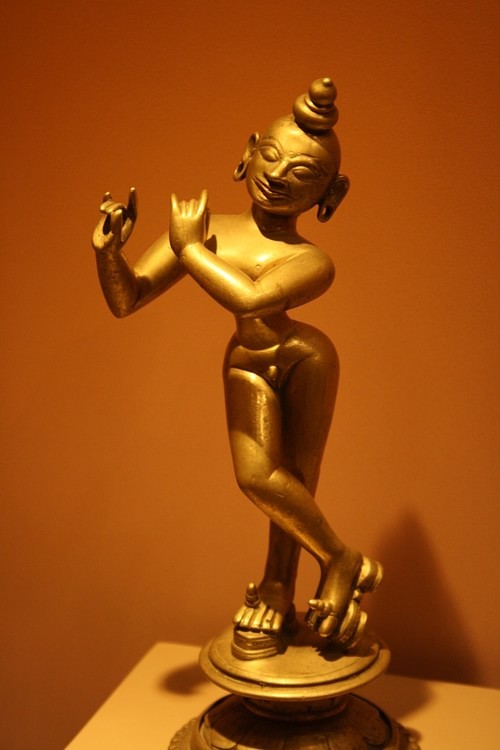
Krishna
Krishna (Krsna or Hari Krishna) is a major god of the Hindu pantheon and considered the eighth incarnation of Vishnu. He is perhaps the most popular of all the heroes of Hindu mythology. Krishna's adventures appear in the Mahabharata, Bhagavad Gita, Harivamsa, and the sacred texts known as the Puranas where he is described as the Supreme Being and creator of the universe.
The most ancient tales of Krishna in sacred texts involve his adventures with the Pandava princes whilst later, stories accumulated over the centuries which describe his eventful youth, when Krishna used his proficient weapons skills to good effect to defeat a host of fearsome enemies, demons and monsters.
Family & Adventurous Youth
According to tradition Krishna belonged to the Yadava - a pastoral race - and the god's birth is picturesquely described in the Mahabharata. One day Vishnu, the great Hindu god pulled two hairs from his own head, one white and one black. The black hair was planted into the womb of Devaki, a princess of the city of Mathura, and so Krishna was born into the Pandava family, his earthly father being Vasudeva. Unfortunately for Krishna his mother's brother, Kamsa, had been warned that Devaki's eighth child would kill him, and so Kamsa determined to murder the eighth child, a crime he had already carried out seven times before Krishna was born. Fortunately, Vasudeva took the precaution of hiding Krishna in the remote village of Vrindavana where the boy was brought up as a simple cowherd (in this guise he can be referred to as Govinda). There he spent an idyllic childhood and stirred the hearts of many gopis or herd-women with his dark good looks, playful charm, and mastery of music and dance.
Thus the story of Krishna contains a double concealment - Krishna is both a god disguised as a mortal and a prince disguised as a commoner. Accordingly, the myths contain many metaphors of disguise, such as a spark within a pile of ashes or a mighty sword in its scabbard, and these hint at Krishna's dual purpose as the punisher of human deeds but also as a bringer of enlightenment.
Krishna's foster parents at Vrindavana were Nanda and Yashoda, his sister is Subhadra, and his brother Balarama. Krishna's favourite consort was the cowherd woman Radha (or perhaps even his wife if they married in secret, as some sources claim). Tradition has it that the god actually acquired 16,108 wives and fathered 180,000 sons. Queen Rukmini, an earthly form of the goddess Lakshmi, is considered Krishna's second most favoured wife after Radha. With Rukmini, Krishna had a son, Pradyumna, and a daughter, Carumati.
Krishna was involved in many escapades in his adventurous youth. Notable amongst these are his various killings and thrashings of prominent enemies such as the ogress Putana, the giant bull danava, the giant snake Kaliya, and the king of the Hayas (horses). Also swiftly dealt with was the scheming tyrant Kamsa – after whose beheading Krishna established himself as king of Mathura. Krishna slew many demons and demon kings: Muru and his 7,000 sons, Pralamba – who Krishna beat up using only his fists, Naraka – son of the Earth and who had accumulated a harem of 16,000 captured women, and the sea-demon Pancajana who looked like a conch shell and who lost his magic shell to Krishna which the hero carried thereafter and used as a trumpet. Krishna also found time to lift the mountain Govardhana to foil a terrible deluge sent by Indra, to conquer Saubha, the floating city of the Titans (daityas), got the better of the sea-god Varuna, and even managed to steal the divine discus possessed by the fire-god Agni. Against mere mortals Krishna also wreaked havoc amongst the Gandharas, Bhojas, and Kalingas, amongst others.
Continue reading...
32 notes
·
View notes
Text
DAY 888
Never expect to get what you give, not everyone has a heart like you.
#vibes#bhagavadgita#self healing#affirmations#positivevibes#spirtuality#motivating myself#law of attraction#karma#meditation#wisdom#willpower#sanathanadharma#srikrishna#happiness#love#peace#hope#faith
10 notes
·
View notes
Text
youtube
Ego Vs True Self - Sunny Sharma
The mind is only a bundle of thoughts. The thoughts arise because there is the thinker. The thinker is the ego. The ego, if sought, will vanish automatically.
— Ramana Maharshi
#advaita#nonduality#spiritual#spirituality#yoga#meditation#hinduism#freedom#self inquiry#peace#ramana maharshi#consiousness#awareness#contemplating life#self realization#self contemplation#who am i#what is real#hinduculture#bhagavadgita#moksha#meditateonthis#meditatedaily#how to meditate#meditative#sri ramana maharshi#tiruvannamalai#lord shiva#lord krishna#nisargadatta
31 notes
·
View notes
Text
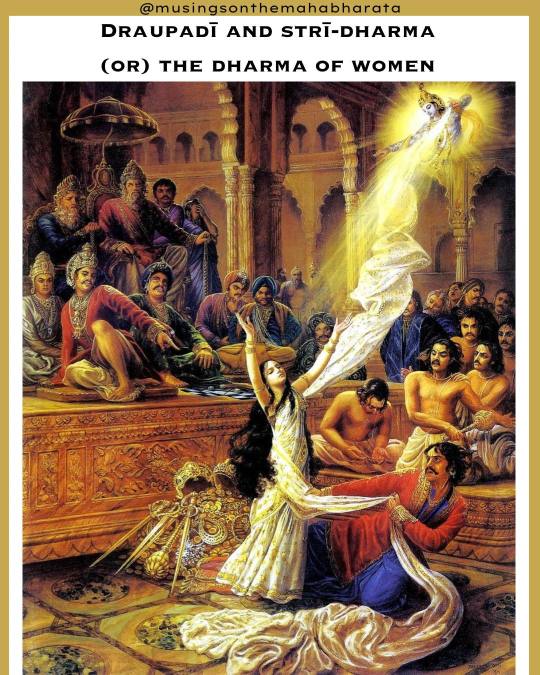
Draupadī and the Dharma of Women
"Strī" translates from Sanskrit as "woman", while "dharma" is a complex principle with manifold meanings, in this context bearing the significance of "duty"; in simple terms, it refers to an individual conduct that contributes to harmony in a greater framework, be it societal or cosmological.
Draupadī is lauded in the Critical Edition of the Mbh several times as being the epitome of strī-dharma, of the dharma of women. (2.62.20; 2.63.25-30; 2.64). Interestingly, she is most intensely praised as such after she angrily (yet elegantly!) questions the men of the royal court and demands justice, being anything but meek and demure. I would argue that this showcases that in the Mahābhārata voicing oneself and standing up for oneself are considered responsibilities belonging to the dharma of women.
To nuance this even more, Eknath Easwaran, an eminent translator of the Bhagavadgītā, highlights that, etymologically, the term "dharma" can be traced back to the root 'dhri', which means 'to support, hold up, or bear'; "dharma" therefore translates as "that which supports", and Draupadī's conduct therefore supports both society and cosmology.
In the Sanskrit Mbh, Kṛṣṇa does not appear in the sabhā (royal hall) at the time of Draupadī's attempted disrobing, and no direct mention of him is made during this episode. In a conversation with Dr. Brian Black, a Mbh researcher whom I had the honour to have as my MA supervisor, we talked about the implication of this, which is that Draupadī's adherence to strī-dharma appears to be that which shields her. A question that could arise here could be whether there is a contradiction between the Critical Edition and modern renderings of the Mahābhārata, with Draupadī being shielded by her dharma as opposed to by Kṛṣṇa.
For me there is no contradiction.
Kṛṣṇa in the Bhagavadgītā establishes himself as 'the eternal dharma' (14.27); and so, Kṛṣṇa is all dharmas, including strī-dharma. We tend to associate Kṛṣṇa with a fully-fledged incarnation; but he is beyond that. I would maintain that, as the divine principle, he exists in Draupadī's consciousness and in her actions as dharma (and not only!). The latter renditions, for me, in which he is physically there, only bring forth in tangible projections the internal process extending Draupadī's consciousness.
You can find me on IG: @musingsonthemahabharata.
Painting: Jadurani Dasi, 1986.
#mahabharata#mahabharat#draupadi#krishna#draupadi's disrobing#hindu art#mahabharatam#panchali#hindu mythology#hinduism#hindu#hindu philosophy#itihasa#sanskrit#phd#phd scholar#dharma#stri dharma#bhagavadgita#bhagavad gita#bhakti#vishnu
93 notes
·
View notes
Text
According to Hinduism, should a person who knows the true nature of one's self be duty-bound to fight for one's country? Does the nature of the human self contradict fighting? If so, only the ignorant should fight. See https://thewordenreport-religion.blogspot.com/2025/02/shankara-knowers-of-self-should-not.html
#Hinduism#Gita#Bhagavadgita#Shankara#Sankara#Advaita Vedantism#Advaita Vedanta#war#warriors#duty#deolology#Krishna#Arjuna#yogic action#renunciation
3 notes
·
View notes
Text
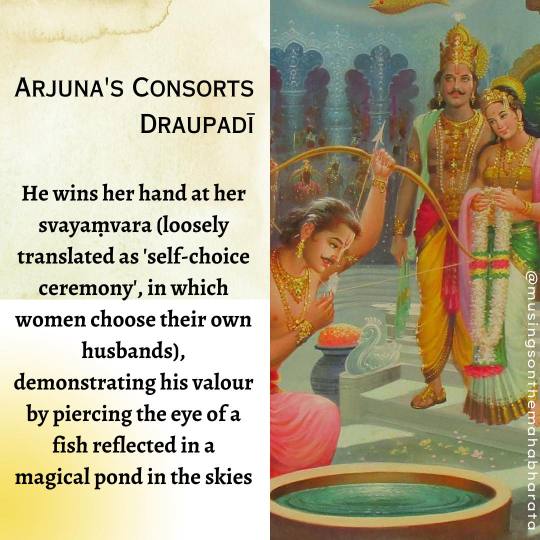
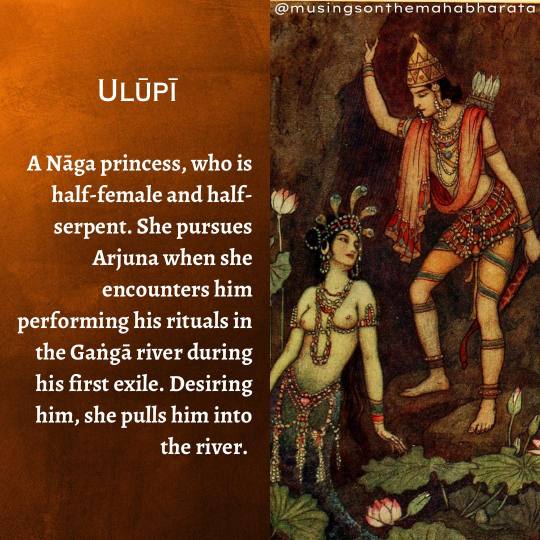
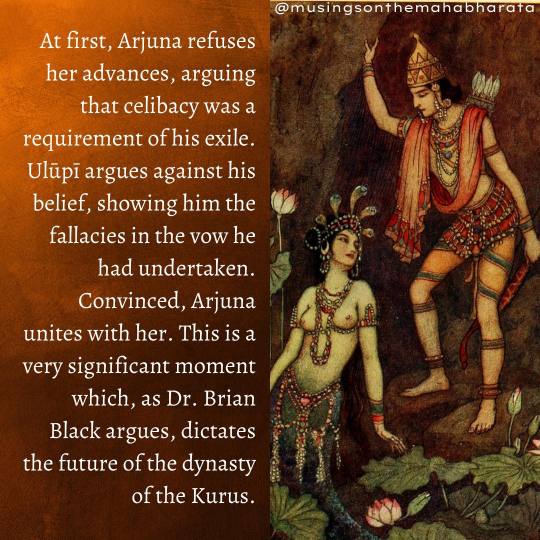
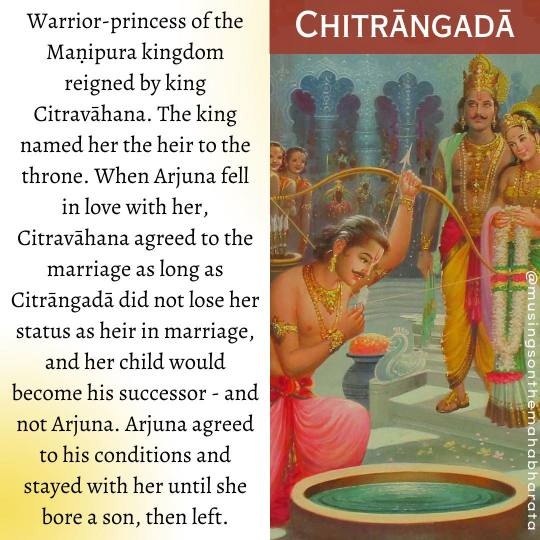
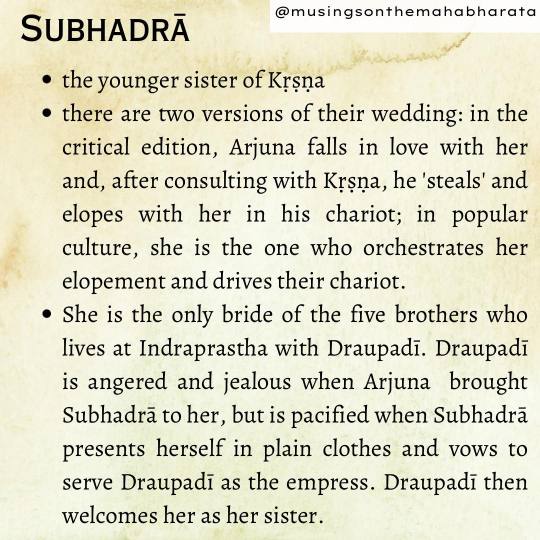

Arjuna's consorts!
#mahabharata#mahabharat#arjuna#arjun#mahabharatam#itihasa#sanskrit#hinduism#hindu art#phd#phd student#phd thesis#subhadra#draupadi#ulupi#chitrangada#bhagavad gita#bhagavadgita#krishna#yajnaseni
44 notes
·
View notes
Text

The generation of questions follows two states of mind; the first is excitement and astonishment, and the second vote is aberrant and rampant.
Man's energy is besotted in corporeity, where he keeps being surprised by the tense; the imitation of the concepts of his soul is embodied in his verbs.
If man pursues his solutions, then he can crystallize his answers properly; it means he has become engaged like an intransigence (Hatha Yogi) in the season of troubles to get rid of that time.
#StatesOfMind #BhagavadGita #Inspiration🙏🙏
4 notes
·
View notes
Text
How to control mind?
Arjuna asked: Oh! Krishna, since the mind is unsteady, turbulent, obstinate, and very strong, controlling the mind is more difficult than controlling the wind." (Bhagavad Gita 6:34) Shri Krishna answered: "Arjuna, no doubt the mind is very difficult to control. However, it can be controlled by constant practice and detachment." (Bhagavad Gita 6:35) Without DETACHMENT to people and things, MIND cannot be controlled. Shri Krishna said : When a person constantly thinks about objects attachment to those objects arises in the mind From attachment, desire is born and from desire, anger is born From anger comes delusion from delusion comes the loss of memory. From the loss of memory comes the destruction of intellect and once the intellect is destroyed, the Person perishes. (Bhagavad Gita Chapter 2: 62, 63)
#krishna#hare krishna#chakras#harekrishna#lordkrishna#Pisces#vishnu#vishnupuran#lordvishnu#bhagavatam#mahabharata#srimadbhagavatam#bhagwan shiv#shrimadbhagwatgeeta#bhagvadgita#bhagavadgita#bhagwan#bhagwatgeeta#bhagavan sri ramana maharshi#bhagavadgītā#bhagwad gita#bhagwatgita#Sagittarius#gitavali#gita#enlightenment#sweet surrender#spiritual enlightment#enlightenyourself#enlightenedconsciousness
127 notes
·
View notes
Text


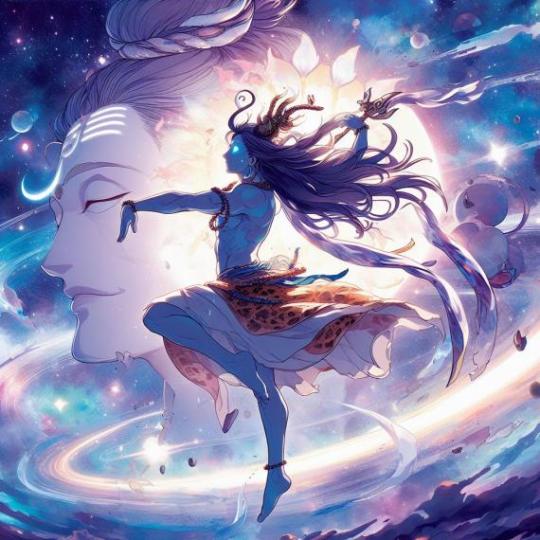
Might I be the most tamasik (ignorant) creature in the cosmos, but knowledge disguised as love flows through you, Bhagavan! Idolizing you makes my heart soft. This tamas is bliss!
#lord shiva#krishna#love#bhakti#devotion#beauty#art#shiva#mahadev#bhagavadgita#gita#flute#bhagavatam#shivaparvatiblessings#parvati#ramayana
221 notes
·
View notes
Text
Lord Balaji darshan from foot to head and vice versa
#venkateshwara#balaji#tirumala#govinda#tirupati#krishna#vishnu#ganesha#telugu#narayana#ttd#lordvenkateshwara#venkateswaraswamy#tirumalatirupati#hindu#lordvishnu#perumal#tamil#lordkrishna#harekrishna#bhagavadgita#lordbalaji#shiva#tamilnadu#tirupatibalaji#lordvenkateshwaraswamy#tirupathibalaji#tirupathi#trust#mahakal
22 notes
·
View notes
Photo
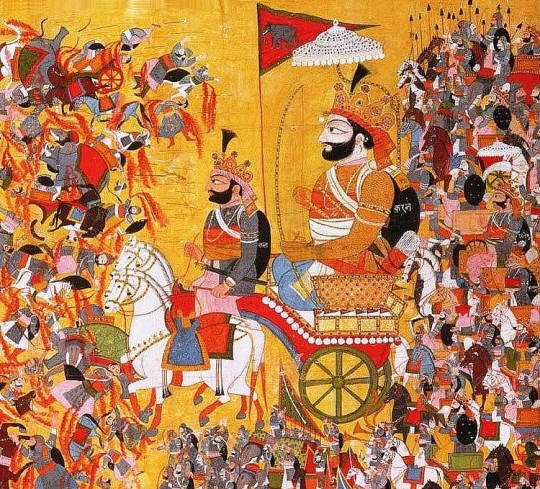
Mahabharata
The Mahabharata is an ancient Indian epic where the main story revolves around two branches of a family - the Pandavas and Kauravas - who, in the Kurukshetra War, battle for the throne of Hastinapura. Interwoven into this narrative are several smaller stories about people dead or living, and philosophical discourses. Krishna-Dwaipayan Vyasa, himself a character in the epic, composed it; as, according to tradition, he dictated the verses and Ganesha wrote them down. At 100,000 verses, it is the longest epic poem ever written, generally thought to have been composed in the 4th century BCE or earlier. The events in the epic play out in the Indian subcontinent and surrounding areas. It was first narrated by a student of Vyasa at a snake-sacrifice of the great-grandson of one of the major characters of the story. Including within it the Bhagavad Gita, the Mahabharata is one of the most important texts of ancient Indian, indeed world, literature.
Learn more about Mahabharata
100 notes
·
View notes
Text
DAY 854
Perfect maturity is when someone hurts you, but you try to understand their situation and not hurt them back.
#vibes#bhagavadgita#self healing#affirmations#positivevibes#spirtuality#motivating myself#law of attraction#karma#meditation#wisdom#willpower#sanathanadharma#srikrishna#happiness#love#peace
7 notes
·
View notes